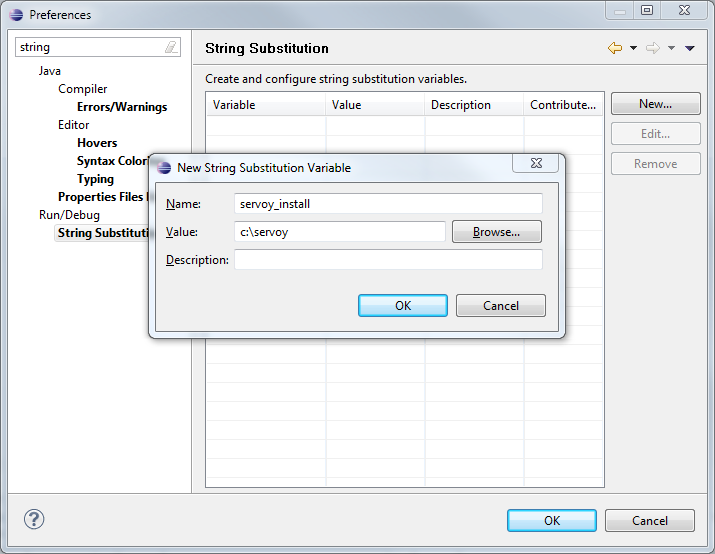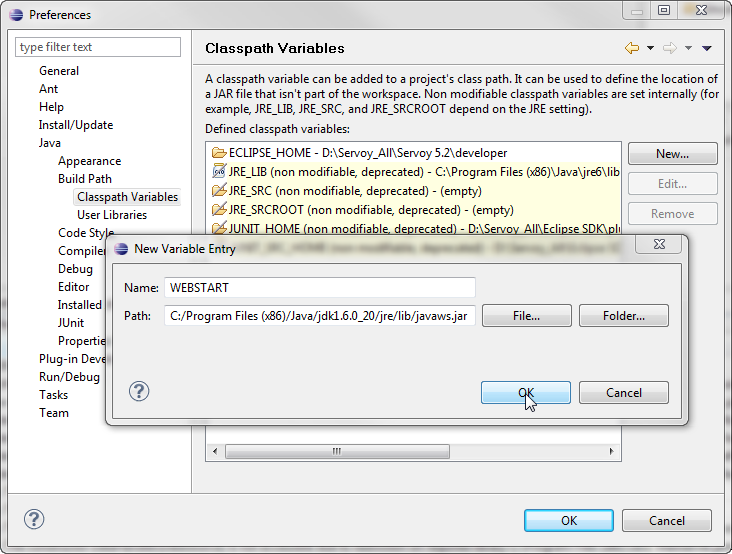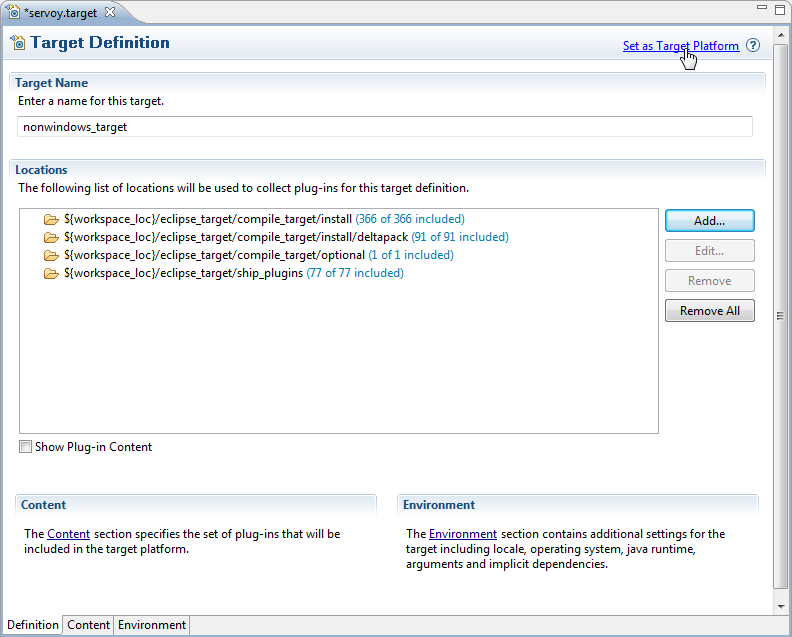Page History
...
- Install Servoy Developer
- Install an Eclipse distribution that contains the plugin development tools for Eclipse (PDE), for example Eclipse Classic
- Setup a String Substitution variable named "servoy_install" which points to the installation directory of the previously installed Servoy Developer
- Create a ClassPath variable named 'WEBSTART' that points to javaws.jar of the used JVM
- Checkout the open source Servoy projects from https://subversion.servoy.com/product, either everything from trunk or one of the branches.
- Setup a Target Platform by:
- Opening the correct servoy.target file, located in the targets directory of the "com.servoy.eclipse.core" project:
- generic.target when running Eclipse and Servoy Developer both under either a 32 or 64 JVM OR the .target file that matches the platform and JVM on which Servoy Developer runs. In this scenario, also add the JVM that Servoy Developer uses as Execution environment to the Eclipse installation and mark it as default.eclipse_target" project
- Clicking the link "Set as Target Platform" of the Target editor
Before getting started: 32 or 64 bit installation
The easiest setup will be when both Servoy Developer and Eclipse operate under either 32 or 64 bit.
Servoy Developer: When installing Servoy Developer, the installer will automatically detect if it's being operated under a 32 or 64 bit Java Virtual Machine and will install a 32 or 64 bit version of Servoy accordingly. By making a certain JVM the default JVM before launching the cross platform Servoy installer or launching the cross platform Servoy installer using a specific JVM, one can control if the installer will install a 32 or 64 bit version of Servoy.
Eclipse: When downloading Eclipse distributions, there are specific downloads available for 32 or 64 bit systems. Note that for Windows, only limited Eclipse distributions offer a download for 64 bit Windows.
When mixing 32 and 64 bit, more configuration is required. This will be discussed under beta:Configuration > Setup the Target Platform.
...
- (or Servoy Launch_mac when on OSX).
Installing Servoy Developer
An installation of Servoy Developer is required in order to be able to launch Servoy Developer from source code, because the source depends on the directory structure that is present in a Servoy Developer installation.
The installer for Servoy Developer can be downloaded after login in at http://www.servoy.com/download. It is important to download the version of Servoy that matches the version of the open source Servoy projects that will be worked on.
Running the installer will install Servoy Developer. For a more indepth description of installing Servoy Developer, see Installing Servoy Developer.After installation, start Servoy Developer and install the SQL Explorer plugin and close Servoy developer again. See SQL Explorer integration for more information.
Installing Eclipse with the Eclipse plugin development tools
...
Setup a variable: Go to Window > Preferences > Run/Debug > String Substitution and create a new variable named 'servoy_install' with the value of the directory where Servoy Developer is installed.
Create a classpath variable: Go to Window > Preferences > Java > Build Path > Classpath Variables and create a new variable named 'WEBSTART' with the value of of javaws.jar in the Java installation.
...
Setup the Target Platform: The Target Platform setting provides the Eclipse instance with information on the Servoy Developer installation, namely whether it's installed to run on a 32 or 64 bit Java virtual Machine (JVM). The checked out Servoy projects already contain the target setup files for different platform/JVM combinations:
...
To check if Eclipse/Servoy Developer runs on a 32 or 64 bit JVM follow the following steps:
- Open Eclipse/Servoy Developer
- Go to Help > About Eclipse/About Servoy Developer > Installation Details > Configuration tab and look for the text '-arch'.
- If the text is followed by 'x86', Eclipse/Servoy Developer runs on 32 bit. If it is followed by 'x86_64', Eclipse/Servoy Developer runs on 64 bit
- Switch to the Java Perspective: Window > Open Perspective > Java
- Expand to com.servoy.eclipse.core > target the eclipse_target project in the Package Explorer
- Open (double-click) the correct servoy.target file:
- when Eclipse and Servoy Developer both run on either a 32 or 64 bit JVM, open the generic.target file otherwise, open the file that matches the Servoy Developer environment
- Click the 'Set as Target Platform'. This will setup the Target Platform correctly, after which projects will be build and should compile without error.
- When using a mixed setup (generic.target is NOT used), the following additional steps are required:
- Add the JVM that is used by Servoy Developer to the Eclipse instance:
- Open window > Preferences > Java > Installed JREs and click "Add"
- Select "Standard VM" and click "Next"
- Select the directory of the JVM used by Servoy Developer as "JRE home" and click "Finish"
- Due to a bug in Eclipse: close the Preferences window
- Open Window > Preferences > Java > Installed JREs > Execution Environments
- Select the correct Execution Environment (the correct version of J2SE/JavaSE) and check the checkbox besides the name of the JRE under "Compatible JREs"that was added in the previous step
- Add the JVM that is used by Servoy Developer to the Eclipse instance:
...


